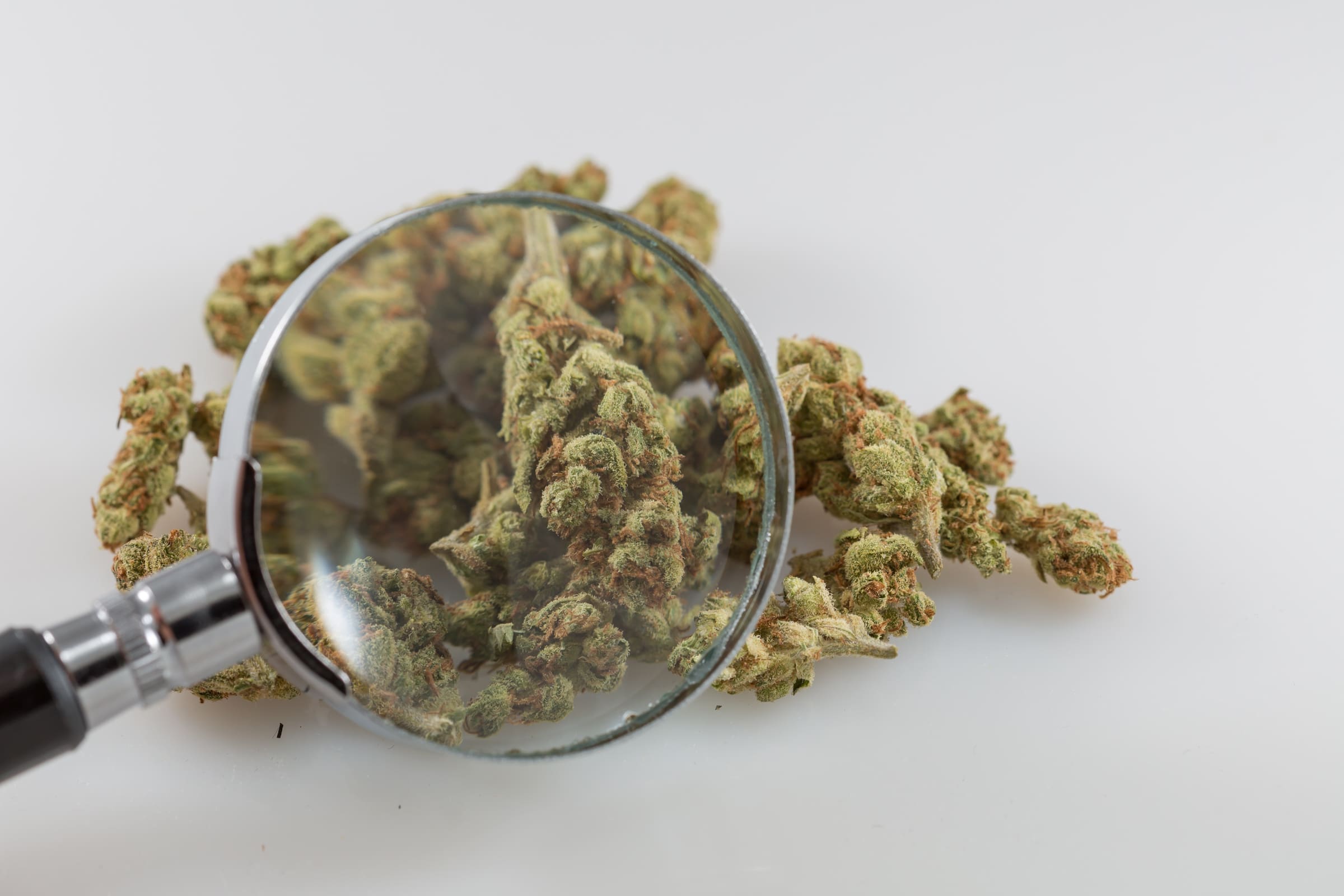Politics
Groups Push DEA To Hold Hearing On Biden Administration’s Marijuana Rescheduling Proposal

Opponents of federal marijuana reform—and some legalization supporters—are requesting that the Drug Enforcement Administration (DEA) hold public hearings on the government’s planned move to reschedule marijuana from Schedule I to Schedule III of the Controlled Substances Act.
Prohibitionists, law enforcement and former DEA leaders are leading the charge for the administrative hearing, asserting that the government’s review process that led to the Schedule III recommendation was deeply flawed, overstates the medical benefits of marijuana and glosses over what the groups say are significant public health risks of rescheduling.
The filings came ahead of a deadline Thursday to submit requests for the hearing. Among them are submissions from groups that oppose the reform, such as a coalition of 18 state attorneys general and a number of former DEA administrators.
Separate from the request for a hearing, the public still has until July 22 to submit comments on the overall rescheduling proposal.
Opposition organizations such as Smart Approaches to Marijuana (SAM) have been successful in turning out critics of the move. The group, which for years has opposed loosening legal restrictions on cannabis, has in recent weeks earned significant national media attention around its pushback to rescheduling.
SAM has also been fundraising around the rescheduling news, sending out asks to supporters almost immediately following the policy announcement. “Our new Rescheduling Legal Defense Fund will be used to support our challenges of marijuana laws and regulations, specifically marijuana’s Schedule III recommendation,” the group’s donation page says.
The group’s leader, Kevin Sabet, also slammed the government’s scientific review process earlier this month, saying that the Food and Drug Administration (FDA) relied on “literally a few very bad studies” to justify rescheduling.
“It’s basically just saying that if it’s popular, then it’s approved, and then it’s accepted,” Sabet said of the process.
SAM has also asked DEA to delay the marijuana rescheduling process itself, arguing that a delay in the rulemaking process is a matter of “public interest.”
Below are excerpts of comments to DEA from various groups and individuals requesting an administrative hearing on the marijuana rescheduling proposal:
State Attorneys General
First, rescheduling marijuana as a Schedule III drug is likely the most consequential rulemaking DEA has ever undertaken. The Proposed Rule carries both national and international ramifications. It would change the definition of currently accepted medical use and would alter the way the federal government implements international treaty obligations under the United Nations’ Single Convention on Narcotic Drugs. The Proposed Rule also represents the most significant relaxation of narcotics restrictions in the history of the CSA. Such sweeping changes cannot properly be made in the absence of a robust administrative record. That’s why Congress required such decisions to be made on the record with an opportunity for a public hearing.
Second, a hearing would aid DEA’s evaluation of the important sociological and scientific issues at stake in any major shift in drug classification. As DEA made clear in the Proposed Rule, additional data and rigorous scientific analysis is needed to determine whether marijuana may be appropriately assigned to Schedule III. A hearing is needed to sort through competing claims about marijuana’s pharmacological effects, potential for abuse, and impacts on public safety. Such a hearing would allow outside experts to present their views on the most current evidence on those topics, and their presentations would be subject to cross-examination. It would also allow local leaders, law enforcement groups, and advocacy organizations to speak on the complexity of this issue.
Reclassifying any drug from Schedule I to Schedule III is a significant change. Especially considering how politically fraught the topics of marijuana use and legalization have become, a dramatic change in the classification of marijuana should not be done lightly or without sufficient public input. DEA should hold a public hearing on the Proposed Rule.
Former DEA Administrators
First, changing marijuana to Schedule III is likely the most consequential rulemaking DEA has ever attempted. Apart from the merits of rescheduling marijuana, it is undeniable that the decision has national and international significance. The rule proposes to change the definition of currently accepted medical use, as well as change the way the federal government implements our international treaty obligations under the Single Convention. It would be the most significant relaxation of narcotics restrictions in the history of the CSA. Such a sweeping change should be undertaken only on a robust administrative record. That is why Congress required that such decisions be made on the record and with opportunity for a hearing.
Second, a hearing would enhance DEA’s evaluation of the important sociological and scientific issues at stake. As DEA made clear in the Proposed Rule, additional data and rigorous scientific analysis is needed to determine whether marijuana is appropriately placed into Schedule III. Sifting through the competing claims about marijuana’s pharmacological effects, potential for abuse, and implications for public safety, are best done at a hearing. It would allow outside experts to offer their view of the latest evidence and be subjected to cross-examination. It would allow local leaders, law enforcement groups, and other advocacy organizations to speak to the complexity of this issue…
We appreciate the complexity of this issue and how it relates to the mission of DEA and believe that a public hearing on this proposal would enhance transparency, integrity, and public confidence in this process, regardless of what final resolution is reached.
Drug Enforcement Association of Federal Narcotics Agents
Recent communication from the Assistant Secretary for Health and Human Services (HHS) in support of rescheduling marijuana is unfounded and in direct contradiction with its own SAMHSA (Substance Abuse and Mental Health Services Administration) evidence-based literature, NSDUH (National Survey on Drug Use and Health) reports, and grantee marijuana attestation requirements.
Numerous independent studies exist which quantify the steep rise in incidence of addiction, psychosis and mental illness directly resulting from increased marijuana use, especially among adolescents. The nexus between chronic use and mental illness is proven to increase homelessness effecting [sic] children and veterans the most. Related increases have been well-documented in marijuana-impaired driving incidents, emergency room visits, and hospitalizations. The negative impact of marijuana is undeniable and, in many cases, permanent. Even HHS’s own NIDA (National Institute on Drug Abuse) continues to publish studies warning about the significant harmful effects of teen marijuana use including permanent IQ reduction and schizophrenia. Administration support of marijuana rescheduling sends a clear message to our country’s youth that risky behavior is condoned, and mental wellness is disregarded.
DEAFNA is comprised of retired and active DEA agents, who unquestionably understand this issue from every perspective. In fact, DEA agents are the only federal employees whose sole mission since 1973 has been to enforce the controlled substances laws and regulations of the United States.
We are adamantly opposed to any intentional move that we predict will have such a drastically negative and permanent impact on public safety and health.
In a separate comment, the group’s president wrote:
We are currently in the throes of the deadliest drug threat in the history of America with respect to the fentanyl crisis. Consideration of such a drastic negative and permanent impact on our nation at this time is at best bad timing, reckless and completely disregards current science.
The first duty of government is to protect our citizens. This is a public safety and public health issue that deserves a formal hearing. Thank you for your commitment to Drug Enforcement and for your kind consideration of our request.
International Academy on the Science and Impact of Cannabis (IASIC)
We have an interest in the proceeding as physicians and concerned citizens of the United States of America who believe that re-scheduling will have immediate and irreparable harm to the public health…
Since botanical cannabis did not meet previous criteria for currently accepted medical use (CAMU), HHS pretextually changed the definition of CAMU from requiring FDA-approval—or meeting FDA’s core standards—to (1) “widespread current experience with medical use” of the substance in the United States by LHCPs operating in accordance with implemented State-authorized programs; and (2) “some” credible scientific support for a least one of those medical uses… Even using this broader definition, botanical cannabis fails to meet CAMU criteria…
The DEA states it will consider the marijuana-specific controls that would be necessary to meet U.S. obligations under the Single Convention, but ignores the issue of state-legal sales of recreational cannabis. Schedule 3 drugs can only be distributed by prescription by DEA registered practitioners. It follows that recreational cannabis stores would have to be shuttered and procedures for medical dispensaries revamped. These issues need to be addressed prior to a final rule.
National Drug and Alcohol Screening Association (NDASA)
The Notice of Proposed Rulemaking (NPRM) issued in this matter contains a significant number of factual inaccuracies. In accordance with 21 CFR sections 1308.44(a) and 1316.47(a), we respectfully request that you grant a hearing on the record to consider the factual documentary evidence and expert witness testimony we would proffer to prove factual inaccuracies submitted by the Department of Health and Human Services (HHS) and upon which the Drug Enforcement Administration (DEA) and the Attorney General are expected to rely for the decision about rescheduling marijuana from Schedule I to Schedule III under the Controlled Substances Act (CSA).
In accordance with 21 U.S.C. 811 and 812, the purpose of a hearing would be to ‘‘receiv[e] factual evidence and expert opinion regarding’’ whether marijuana should be transferred to schedule III of the list of controlled substances. We recognize the HHS’s scientific and medical determinations are accorded ‘‘significant deference’’ through the rest of the rulemaking process. However, scientific and medical determination based on flawed factual assumptions and incorrect data should not be afforded such deference. We respectfully submit that flaws in reasoning and incorrect factual assertions should be addressed by an administrative law judge, as the decider of fact, in this formal rulemaking process.
Before a final decision is reached on rescheduling, we respectfully request a hearing on the factually incorrect assertions of HHS, upon which the DEA and the Attorney General are relying in the proposal to make marijuana a Schedule III drug under the Controlled Substances Act. It is essential that the final rule rests upon solid reasoning and reliable facts.
Tennessee Bureau of Investigation (TBI)
TBI joins other groups in strongly opposing the Department of Justice’s (DOJ) proposal to reschedule marijuana from Schedule I to Schedule III… A central concern is DOJ’s apparent lack of adherence to the established Eight Factor Analysis for evaluating the scientific and medical basis of such a rescheduling. Any rescheduling should be based on comprehensive scientific research, which it appears the Proposed Rule lacks. Aside from the deviation in the rescheduling process, TBI has concerns about the criminal justice, public-health, and social consequences of increased prevalence of marijuana that rescheduling would inevitably produce in our State. These consequences, which have played out in other States after legalization in some form, include: the heightened risk associated with the use of genetically modified and synthetically manipulated marijuana; the lack of necessary regulatory, pharmaceutical, medical, scientific, and enforcement infrastructure to manage the reschedule; and the inability to regulate marijuana production and prevent organized crime from exploiting the market, among other problems…
TBI would appreciate the opportunity to share and substantiate these concerns at a public hearing on the proposed rule.
Smart Approaches to Marijuana (SAM)
Moving marijuana to Schedule III will negatively affect SAM by reducing restrictions on access to marijuana and thereby requiring SAM to divert resources and expend additional funds on new and different lines of effort to protect those most at risk-including at-risk youth-from the harms produced by more ready access to this psycho-active substance. A sweeping change in the regulatory environment would require SAM to divert resources from its current advocacy and informational efforts and expend resources on entirely different projects…
As the most significant relaxation of restrictions on a psychoactive substance in the history of the CSA, the Proposed Rule deserves full consideration through a hearing on the record. In the NPRM, DEA went out of its way to request “additional information” and “expert opinions” on a host of complex subjects. SAM requests a hearing to present evidence on the subjects identified by DEA…
SAM believes that the assessment of marijuana’s actual or relative potential for abuse in the Proposed Rule is flawed. At a hearing, SAM would present evidence bearing upon several points demonstrating that marijuana has a higher actual rate of abuse and higher potential for abuse than acknowledged in the analysis presented by HHS.
The Proposed Rule also downplays the unique risks that marijuana poses to youth and adolescents. At a hearing, SAM would provide expert testimony showing that cannabis use harms adolescent brain development, diminishes learning, and inhibits mental processing speed. This evidence is critical because this aspect of the public health risks posed by marijuana appears to have been ignored by HHS…
To change marijuana’s designation as a Schedule I substance, HHS had to change the standard for determining “currently accepted medical use.” The new test uses only two factors under which a substance has an accepted medical use, namely i) if licensed healthcare providers have widespread current experience with medical use of the drug and ii) if that medical use has “some credible scientific support.”
At a hearing, SAM would present testimony showing that marijuana does not satisfy the second factor of the new test because there is not credible scientific support that marijuana can be used to treat anorexia, chemotherapy-induced vomiting, or pain.
Khurshid Khoja, Greenbridge Corporate Counsel
I would be adversely affected or aggrieved by the Proposed Rule, and specifically the Drug Enforcement Administration’s proposed definition of “Tetrahydrocannabinol” … which would sweep currently non-scheduled cannabinoids without a formal scheduling action as required under the Controlled Substances Act (“CSA”) at 21 USC §811(a). This would potentially contradict the advice that I, other legal counsel and other legally-compliant operators throughout the cannabinoid industries have relied upon in good faith for over two decades…
I strongly oppose any misapplication of the proposed definition to place all non-scheduled synthetic cannabinoids under tetrahydrocannabinols (including, but not limited to, therapeutically beneficial and non-intoxicating cannabinoids like CBD, THCV and THCA). As such, I respectfully ask the DEA to revise the proposed definition of “Tetrahydrocannabinol” … to address any potential confusion over the definition.
My concern is prompted by the DEA’s recent pronouncements, which suggest that the DEA may well apply its proposed regulation to lawful non-scheduled synthetically-derived non-intoxicating cannabinoids. …
In a separate email to Marijuana Moment this week about other parties’ requests for a DEA hearing, Khoja wrote:
I’ve been reviewing the various requests for hearing from the former DEA administrators, state AGs, Project SAM, etc.—what I’ve found interesting is the expressions of concern over how DEA will approach US legal compliance with our obligations under the Single Convention once marijuana is rescheduled. None of these parties expressed the same concerns when Epidiolex was rescheduled and the DEA proposed a similar approach to compliance via a combination of rescheduling actions and agency regulations… Additionally, they all presume that we have actually been in compliance with the Single Convention to begin with, which is dubious, not only because of the growth of the state regulated marijuana markets, but also because of the way we have historically licensed cultivation through the DEA and NIDA (per an OLC memo published in 2018…) If you read the Single Convention carefully, it actually provides quite a bit of latitude to federal constitutional governments like the US to carry out its compliance obligations via a combination of federal and even state agencies in light of significant conflicts between state and federal laws on marijuana.
Anonymous Parent
Cannabis is going to be the next “opioid crisis” in the United States. My 22-year-old son is now in residential rehab for the 4th time since he was 17 for cannabis use disorder. Cannabis IS addictive…
I am a member of a group of more than 1500 parents who have come together on Facebook – each of them with a child (and in some cases multiple children) who is/was in Cannabis Induced Psychosis. These are not “one-off” incidents – these are barely touching the surface of the size of the problem. To shift cannabis from a Schedule 1 to a Schedule 3 drug gives credence to the cannabis industry’s mantra that “pot is not dangerous”. If the DEA affirms with this proposed change that it’s not dangerous, then it MUST be true in the eyes of every young teen who decides to try it but is clueless about the potential life-altering outcomes of smoking high-potency cannabis.
Don’t just take the word of cannabis industry hacks who write numerous fake responses to these regulations – hold hearings – listen to parents whose children have mental health issues from it, addiction counselors and psychiatrists who treat it every day, and to teens and young adults who have suffered from psychosis and worse mental health diagnoses from smoking high potency cannabis.
Steven Michael Coleman, author of “Treating Myself With Cannabis”
I am submitting a copy of my book as my primary comment. I respectfully urge you not to alienate 85%+ of the population (as of now) and continue the ludicrous restrictions of this naturally occurring plant. You are doing actual harm to the citizenry by attempting to ban nature and failing to treat the sick…
You will never legislate other than the truth and you will [sow] rebellion by trying to do so for much longer. Please read my book and accept that I survived the terrible accident that I did so that I could speak with authority directly to you motherfuckers. I cured myself from pain I would not wish on anyone. I need you to hold that possibility in your mind, read my book, and contact me on how I might help you going forward.
National advocacy groups in support of marijuana reform, meanwhile, such as the Drug Policy Alliance (DPA), Marijuana Policy Project (MPP), NORML and National Cannabis Industry Association (NCIA), told Marijuana Moment last week that they did not plan to request a hearing ahead of Thursday’s deadline.
Meanwhile, rescheduling opponents have amplified rumors that current DEA officials might oppose the proposed change—rumors that a top Biden administration official appeared to acknowledge this month.
In early May, SAM President Kevin Sabet said he’d heard rumors that DEA Administrator Anne Milgram “did not sign off” on the landmark decision, suggesting that the agency wasn’t on board. As it turned out, Milgram did not put her name on the proposed rescheduling rule, leaving it to Attorney General Merrick Garland to sign the document.
GOP lawmakers in Congress questioned Milgram about the matter during a hearing, but she replied it would be “inappropriate” to comment.
As for what happens next, SAM leaders said at a recent event that they’re holding out hope that DEA could reject the rescheduling recommendation or, alternatively, move marijuana to Schedule II.
While DOJ will take all public comments submitted by July 22 into consideration as it weighs the reform, it said in the notice that one of the topics its especially interested in hearing about is the “unique economic impacts” of the rescheduling proposal given that state-level legalization has created a “multibillion dollar industry” that stands to benefit from possible federal tax relief under the reform.
Indications that DEA might not be on board came alongside the rescheduling move itself, with the proposed rule in the Federal Register noting several times that the agency believes “additional information” needs to be collected via public comment or a possible administrative hearing could influence the final scheduling decision.
“DEA has not yet made a determination as to its views of the appropriate schedule for marijuana,” the document said.
Even before the formal announcement, it had been reported that certain DEA officials had been “at odds” with the Biden administration over the rescheduling push.
Asked about the status of the proposed move of cannabis to Schedule III of the Controlled Substances Act at a recent event in Sacramento, HHS Secretary Xavier Becerra said his agency made its recommendation based on available science and evidence.
Asked whether there was resistance at DEA, he responded, “Talk to the DEA.”
“Our scientists reviewed the evidence,” Becerra added. “FDA bases its action on the science and the evidence before us. We took action.”














